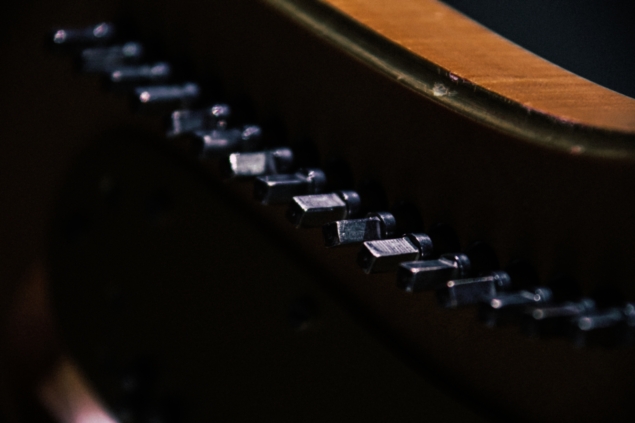Music traditionally functions in two categories—tempo and pitch. And Yet It Moves showcases works by composers of the sixteenth and twenty-first centuries who use a third category—the dimension of space.
And Yet It Moves
- Date:
- 21 May 2024,
20:00–21:30
- Age restrictions
- 12+
Programme
Thomas Tallis (1505-1585)
Spem in alium
(“I have never put my hope in any other but in thee, God of Israel,” c. 1570)
Boris Filanovsky (b. 1968)
Architecton Theta (2019)
Sound sculpture for ensemble, chorus, and listeners in motion
Moscow premiere
Thomas Tallis (1505-1585)
Spem in alium
The works by the master of the English High Renaissance Thomas Tallis and contemporary composer Boris Filanovsky make the relative spatial locations of performer and listener an integral part of the musical effect. In And Yet It Turns the effect of these two works is enhanced by stationing several groups of performers at a distance from each other around
Performers
Intrada Choir
Ekaterina Antonenko conductor
Moscow Contemporary Music Ensemble | MCME
Elizaveta Korneeva conductor
Presented by Yaroslav Timofeev

Photo: Anya Todich
To call Architecton a musical work is really a misnomer. Rather it is an analogue of Malevich’s ‘movement of pictorial planes,’ which I have tried to unfold in time and sound. From each point you can hear only a part of the Architecton, a part which is at once similar to the other parts but noticeably different from them both musically and by its position in space; you have to change your locus of hearing in order to try and grasp the whole. So the ‘music itself’ is in abstract motion as to its pitch and tempo, while the listeners are in physical motion.
—Boris Filanovsky
The usual concert ritual—musicians on stage, audience immobile in the hall—compels a collective experience. And Yet It Moves moves away from that stereotype, allowing each member of the audience to choose their own trajectory through space, varying their auditory impressions and building their own musical plot.
Spatial distancing of the eight five-voice choirs that are required by Tallis’ monumental 40-part motet, Spem in alium (“Hope in any other”), creates a kaleidoscope of musical ideas and vocal lines that the ear can barely follow. The motet will be performed twice, at the beginning and at the end of the programme, enabling listeners to compare different impressions of the piece obtained from different spatial positions and trajectories.
Boris Filanovsky’s Architecton Theta, commissioned by the PRO ARTE Foundation and first performed at Saint Petersburg’s Bolshoi Drama Theatre, is structured in a similar way to the Tallis motet. “Architecton” in the work’s title refers to the Suprematist art movement and specifically to the architectural and engineering experiments of Kazimir Malevich. “Theta” (θ) is the first letter of the Greek word theatron, meaning “theatre.” Architecton Theta is not so much a concert piece as an immersive (theatrical) performance. It cannot be appreciated in its entirety from any one point in space and the listener achieves a smoothly changing acoustic focus by moving around the Prospekt. Interacting with Renzo Piano’s architecture, the composer intertwines instrumental ensemble and choir to create a single sounding body. The main public space at the House of Culture is transformed into a giant musical instrument.
Intrada choir was created in 2006 by Ekaterina Antonenko, a graduate of the Moscow Conservatory. The choir has taken part in many highly regarded musical projects in Russia and abroad, winning a reputation for its versatility and professionalism. Acclaimed “Musical ensemble of the year” by Russia’s Musical Review in 2019 and 2021, Intrada works with leading Russian and foreign groups and musicians, including the Moscow Soloists led by Yury Bashmet, the Svetlanov State Orchestra of Russia under Vladimir Jurowski, the Russian National Orchestra under Mikhail Pletnev, Le Poème Harmonique (Vincent Dumestre), Il Giardino Armonico (Giovanni Antonini), The Tallis Scholars (Peter Phillips), VOCES8, I Fagiolini (Robert Hollingworth), the Orchestra of the Age of Enlightenment, Frieder Bernius, Stephen Layton, Hans-Christoph Rademann, Peter Neumann, Jean-Christophe Spinosi, and many others. Performances by Intrada are a regular part of the December Nights festival at the Pushkin Museum in Moscow.
Moscow Contemporary Music Ensemble (MCME) was created in 1990 by composer Yuri Kasparov assisted by Russian avant-garde luminary Edison Denisov. MCME was the first Russian ensemble to focus on music of the 20th and 21st centuries and performance of new pieces by contemporary composers. MCME has given Russian and world premieres of more than 1000 works.
Yaroslav Timofeev (b. 1988, Novgorod) is a musician, musicologist, concert presenter, and lecturer. He is a graduate of the Moscow Conservatory, chief editor of Musical Academy magazine and has worked since 2010 at the Moscow Philharmonia (Russia’s largest concert organisation) where he leads a number of projects: Mum, I’m Crazy about Music (since the 2017/2018 season), The Language of Music (co‑author and presenter since 2018/2019), Thing-in-Itself (author and presenter since 2021/2022), and All Stravinsky (author and presenter since 2022/2023). He performs as a pianist with the Russian indie group OQJAV.

